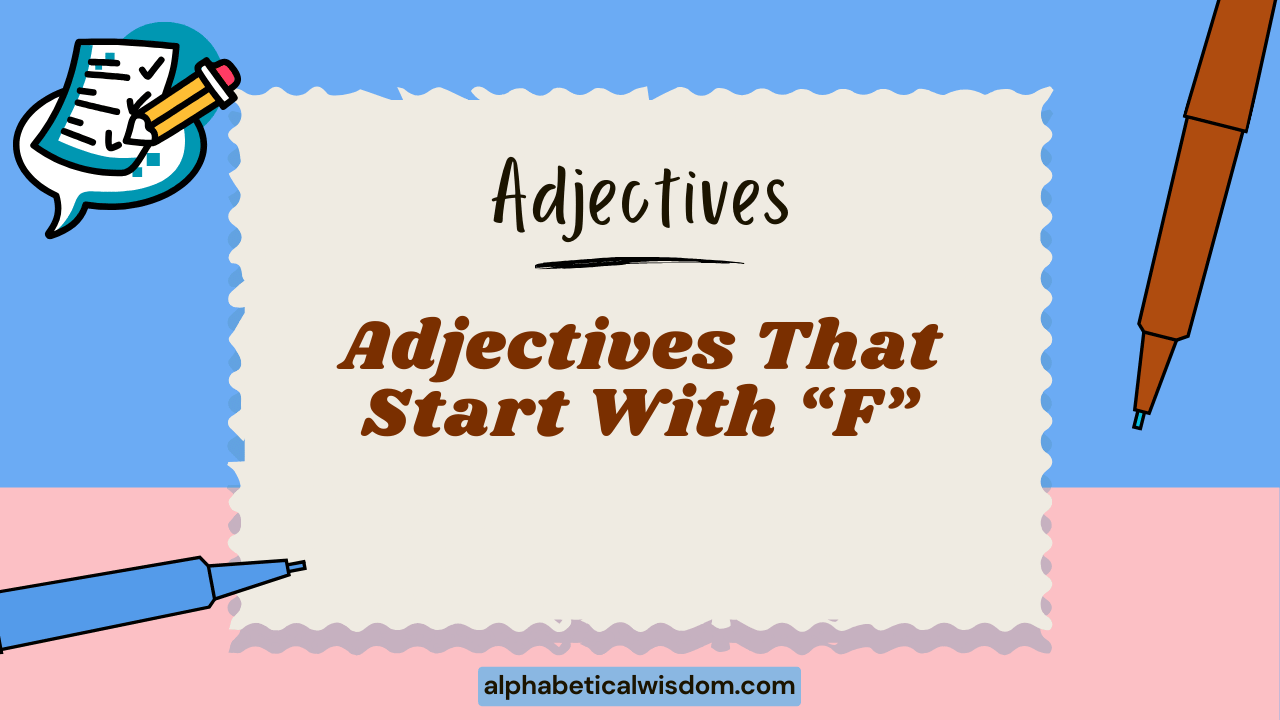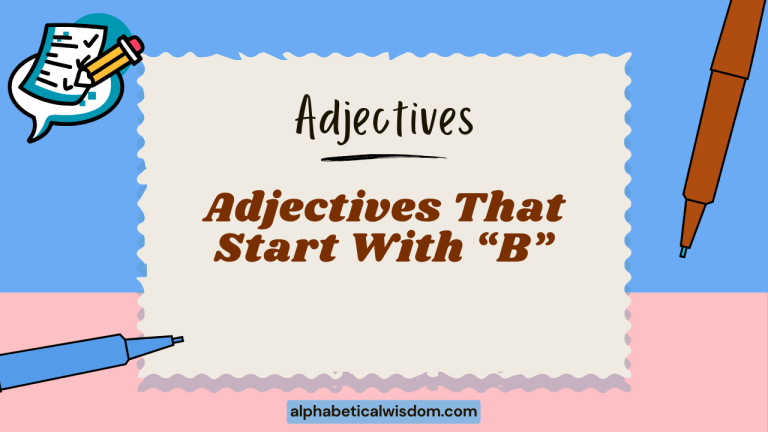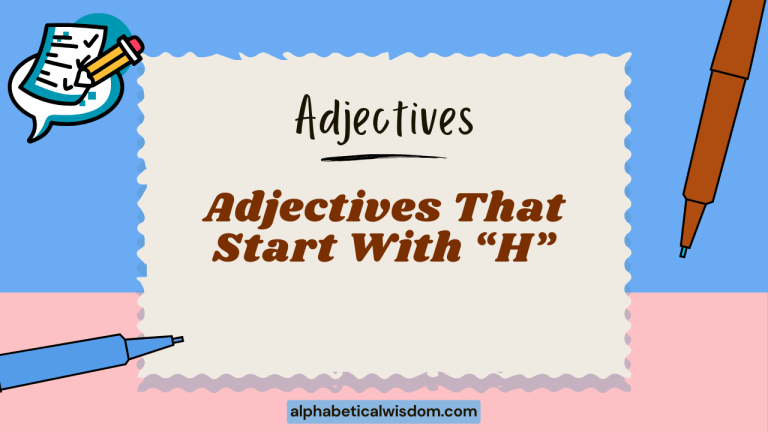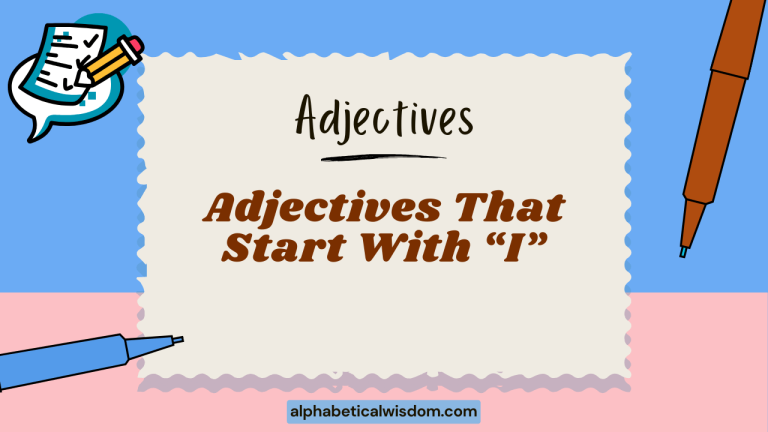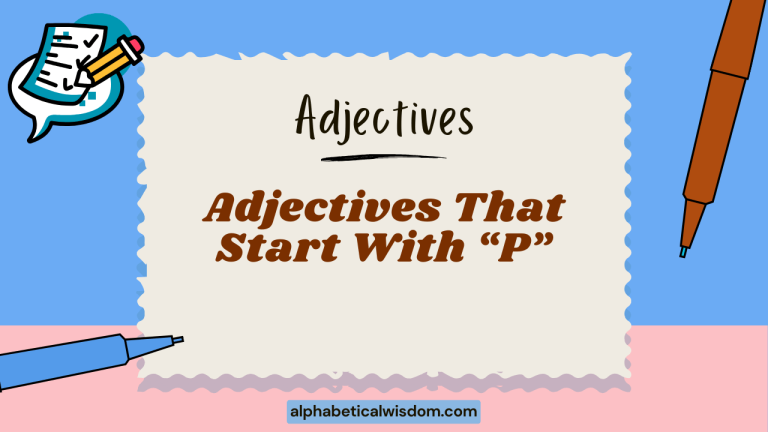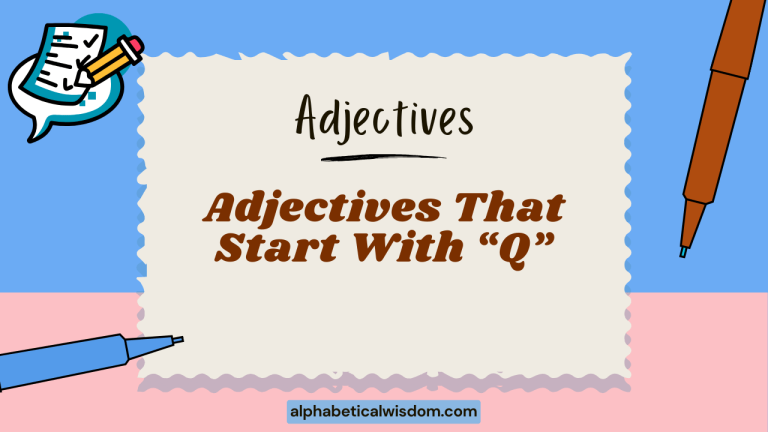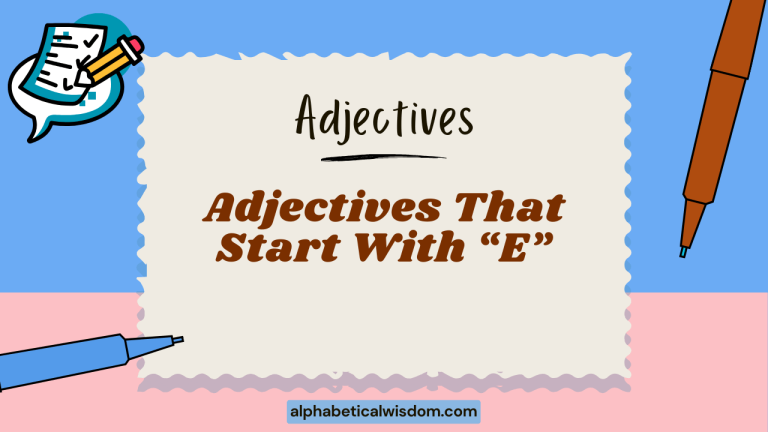Adjectives That Start With F: A Comprehensive Guide
Adjectives are the spice of language, adding color and detail to our descriptions. Mastering adjectives, especially those starting with specific letters like ‘F,’ can significantly enhance your vocabulary and writing skills.
This guide provides a detailed exploration of adjectives that begin with ‘F,’ covering their meanings, usage, and examples. Whether you’re a student, writer, or language enthusiast, this comprehensive resource will help you expand your understanding and effective use of these descriptive words in English.
This article aims to thoroughly explore adjectives beginning with the letter “F,” enhancing your vocabulary and improving your writing skills. By understanding the nuances and applications of these adjectives, you can more effectively communicate your ideas and add depth to your descriptions.
This guide is designed for students, writers, and anyone eager to improve their English language proficiency.
Table of Contents
- Definition of Adjectives
- Function of Adjectives
- Structural Breakdown
- Types of Adjectives Starting with F
- Examples of Adjectives Starting with F
- Usage Rules for Adjectives Starting with F
- Common Mistakes with Adjectives Starting with F
- Practice Exercises
- Advanced Topics
- FAQ
- Conclusion
Definition of Adjectives
An adjective is a word that modifies a noun or pronoun, providing more information about its qualities, characteristics, or state. Adjectives enrich language by adding detail and specificity, enabling more vivid and precise communication.
They answer questions like “What kind?”, “Which one?”, “How many?”, and “How much?” about the nouns they modify.
Adjectives play a critical role in descriptive writing and everyday conversation. They help paint a clearer picture for the reader or listener, making the language more engaging and informative.
Without adjectives, our communication would be bland and lack the necessary detail to convey precise meanings.
Function of Adjectives
The primary function of an adjective is to describe or modify a noun or pronoun. This modification can involve specifying a quality, size, color, origin, or any other attribute that provides additional information about the noun.
Adjectives can appear before the noun they modify (attributive position) or after a linking verb (predicative position).
In the attributive position, the adjective directly precedes the noun, such as in “a fantastic journey.” In the predicative position, the adjective follows a linking verb like is, are, was, or seem, as in “The journey was fantastic.” Understanding these positions is crucial for correct sentence construction.
Structural Breakdown
Adjectives in English do not typically change form to agree with the noun they modify in terms of number or gender, which simplifies their usage compared to some other languages. However, adjectives can be modified by adverbs to indicate the degree of the quality they describe, such as “very fast” or “extremely frightening.”
Many adjectives are formed from nouns or verbs by adding suffixes such as -ful, -less, -able, -ive, or -ous. For example, the noun “fruit” becomes the adjective “fruitful” with the addition of the suffix -ful.
Recognizing these patterns can help expand your vocabulary and understand the meanings of new words.
Types of Adjectives Starting with F
Adjectives starting with ‘F’ can be categorized based on their meaning and usage. Here are some common categories:
Descriptive Adjectives
These adjectives describe the qualities or characteristics of a noun. Examples include fantastic, fabulous, fair, and fragrant.
Evaluative Adjectives
These adjectives express an opinion or judgment about a noun. Examples include fair, foolish, frightful, and fantastic (when used to express admiration).
Adjectives of Origin
These adjectives indicate the origin or nationality of a noun. Examples include French, Finnish, and Filipino.
Quantitative Adjectives
These adjectives specify the quantity or amount of a noun, though fewer adjectives starting with ‘F’ fall into this category. An example would be ‘few’.
Examples of Adjectives Starting with F
Here are several examples of adjectives starting with ‘F’ used in sentences, categorized for clarity.
Descriptive Adjectives Examples
The following table showcases descriptive adjectives that start with the letter F.
| Adjective | Example Sentence |
|---|---|
| Fabulous | The party was a fabulous success. |
| Fantastic | We had a fantastic time at the beach. |
| Fair | She has fair skin and blonde hair. |
| Faithful | The dog is a faithful companion. |
| Familiar | His face looked familiar to me. |
| Famous | The actor is famous for his roles in action movies. |
| Fancy | They live in a fancy house. |
| Fast | The car is very fast. |
| Fat | The cat is a little fat. |
| Fatal | The accident was fatal. |
| Favorable | The weather is favorable for a picnic. |
| Favorite | Blue is my favorite color. |
| Fearful | The child was fearful of the dark. |
| Feasible | The plan seems feasible with enough resources. |
| Feline | The cat had feline grace. |
| Fertile | The land is fertile and good for farming. |
| Festive | The decorations made the room look festive. |
| Few | Only a few people attended the meeting. |
| Fierce | The storm was fierce. |
| Filthy | The room was filthy. |
| Fine | The weather is fine today. |
| Firm | He has a firm handshake. |
| First | This is my first time here. |
| Fit | She is very fit and healthy. |
| Fixed | The price is fixed and cannot be changed. |
| Flat | The land is flat. |
| Flawless | Her performance was flawless. |
| Flexible | The material is very flexible. |
Evaluative Adjectives Examples
The following table showcases Evaluative adjectives that start with the letter F.
| Adjective | Example Sentence |
|---|---|
| Foolish | It was foolish of him to go out without a coat. |
| Frightful | The storm was a frightful experience. |
| Fantastic | The concert was fantastic! |
| Faulty | The equipment was faulty. |
| Frivolous | His spending habits are quite frivolous. |
| Frustrating | Dealing with the bureaucracy was frustrating. |
| Fussy | The child is a fussy eater. |
| Fake | The painting was a fake. |
| False | The statement was false. |
| Foul | The smell was foul. |
| Fragile | The glass is very fragile. |
| Feeble | His attempt was feeble. |
| Fearsome | The dragon was fearsome. |
| Forlorn | The abandoned house looked forlorn. |
| Fortunate | We were fortunate to escape the fire. |
| Frightened | The child was frightened by the loud noise. |
| Frozen | The lake was frozen solid. |
| Fruitless | Their efforts were fruitless. |
| Furious | He was furious about the mistake. |
| Futile | Their attempts to revive him were futile. |
Adjectives of Origin Examples
The following table showcases adjectives of origin that start with the letter F.
| Adjective | Example Sentence |
|---|---|
| French | She speaks French fluently. |
| Finnish | The Finnish sauna is a popular tradition. |
| Filipino | We enjoyed Filipino cuisine. |
| Faroese | The Faroese language is unique. |
| Flemish | He studied Flemish art. |
More Examples of Adjectives Starting with F
Here are more examples of adjectives beginning with ‘F’ to further illustrate their usage:
| Adjective | Example Sentence |
|---|---|
| Fragrant | The garden was filled with fragrant flowers. |
| Free | The birds are free in the sky. |
| Fresh | We bought fresh vegetables from the market. |
| Friendly | The people in the village were very friendly. |
| Full | The glass is full of water. |
| Functional | The new software is very functional. |
| Fundamental | Understanding grammar is fundamental to learning a language. |
| Funny | The movie was very funny. |
| Further | We need further information. |
| Future | The future looks bright. |
| Formal | The event required formal attire. |
| Former | He is a former employee of the company. |
| Forward | He took a forward step. |
| Frank | She was frank in her opinion. |
Usage Rules for Adjectives Starting with F
Using adjectives correctly involves understanding their placement in a sentence and how they interact with other words. Here are some key rules:
Adjective Order
When using multiple adjectives to describe a noun, there is a general order to follow. The typical order is: opinion, size, age, shape, color, origin, material, and purpose. For example: “a beautiful (opinion) large (size) old (age) round (shape) red (color) French (origin) wooden (material) dining (purpose) table.”
Attributive vs. Predicative Use
As mentioned earlier, adjectives can be used attributively (before the noun) or predicatively (after a linking verb). Some adjectives are more commonly used in one position than the other.
For example, “elder” is typically used attributively (“the elder brother”), while “afraid” is typically used predicatively (“He is afraid”).
Compound Adjectives
Compound adjectives are formed by combining two or more words, often hyphenated. Examples include “far-reaching consequences” and “full-time job.” These adjectives function as a single unit to modify a noun.
Comparative and Superlative Forms
Many adjectives can form comparative and superlative degrees to show relative qualities. For one-syllable adjectives, add -er for the comparative and -est for the superlative (e.g., fast, faster, fastest).
For longer adjectives, use “more” and “most” (e.g., famous, more famous, most famous).
Common Mistakes with Adjectives Starting with F
Here are some common mistakes to avoid when using adjectives starting with ‘F’:
Misusing “Farther” vs. “Further”
Farther refers to physical distance, while further refers to metaphorical or abstract distance.
- Incorrect: “I need to walk further down the road.”
- Correct: “I need to walk farther down the road.”
- Incorrect: “I need farther information on the topic.”
- Correct: “I need further information on the topic.”
Incorrect Adjective Order
Placing adjectives in the wrong order can sound awkward. Remember the general order: opinion, size, age, shape, color, origin, material, purpose.
- Incorrect: “a red big ball”
- Correct: “a big red ball”
Using Adjectives as Adverbs
Adjectives modify nouns, while adverbs modify verbs, adjectives, or other adverbs. Using an adjective in place of an adverb is a common mistake.
- Incorrect: “He ran fastly.”
- Correct: “He ran fast.”
Confusing Similar Adjectives
Some adjectives have similar meanings but are used in different contexts. For example, “frightened” and “frightening” both relate to fear, but “frightened” describes someone experiencing fear, while “frightening” describes something that causes fear.
- Incorrect: “The movie was frightened.”
- Correct: “The movie was frightening.”
- Incorrect: “He was frightening.”
- Correct: “He was frightened.”
Practice Exercises
Test your understanding of adjectives starting with ‘F’ with these exercises.
Exercise 1: Fill in the Blanks
Fill in the blanks with an appropriate adjective starting with ‘F’.
| Question | Answer |
|---|---|
| 1. The weather is ______ today; let’s go for a walk. | Fine |
| 2. She is a ______ friend; I can always count on her. | Faithful |
| 3. The pizza was ______; I ate the whole thing. | Fabulous |
| 4. He is ______ of heights. | Fearful |
| 5. The plan seems ______, but we need more resources. | Feasible |
| 6. They live in a ______ house on the hill. | Fancy |
| 7. The car is incredibly ______. | Fast |
| 8. The land is very ______, perfect for growing crops. | Fertile |
| 9. The decorations made the party look very ______. | Festive |
| 10. Only a ______ people showed up to the event. | Few |
Exercise 2: Correct the Sentence
Correct the sentences that use adjectives starting with ‘F’ incorrectly.
| Question | Answer |
|---|---|
| 1. I need to walk further down the road. | I need to walk farther down the road. |
| 2. The movie was frightened. | The movie was frightening. |
| 3. She ran fastly. | She ran fast. |
| 4. He is a former employee now. | Correct. |
| 5. The smell was fragile. | The smell was foul. |
| 6. They had a fantastically time. | They had a fantastic time. |
| 7. The plan seems feasibly to me. | The plan seems feasible to me. |
| 8. She is fearful with spiders. | She is fearful of spiders. |
| 9. The pizza tasted fabulously. | The pizza tasted fabulous. |
| 10. He gave a frankful response. | He gave a frank response. |
Exercise 3: Multiple Choice
Choose the correct adjective to complete each sentence.
| Question | Answer |
|---|---|
| 1. She has a _______ smile. (a) fabulous (b) fair (c) fancy (d) fast |
(a) fabulous |
| 2. The ______ language spoken in Belgium is Flemish. (a) French (b) Finnish (c) Flemish (d) Filipino |
(c) Flemish |
| 3. The ______ consequences of his actions were severe. (a) few (b) full (c) far-reaching (d) faint |
(c) far-reaching |
| 4. The ______ flowers perfumed the air. (a) fragile (b) fragrant (c) frank (d) frugal |
(b) fragrant |
| 5. The _____ cat prowled through the garden. (a) fearful (b) feline (c) festive (d) firm |
(b) feline |
| 6. He is ______ of spiders. (a) freighted (b) frightening (c) frightened (d) frightful |
(c) frightened |
| 7. It was ______ of him to leave his coat behind. (a) former (b) fortunate (c) foolish (d) forward |
(c) foolish |
| 8. The material is very ______, allowing for easy bending. (a) fixed (b) flat (c) flexible (d) foul |
(c) flexible |
| 9. We had ______ weather for our picnic. (a) favorable (b) fatal (c) faulty (d) feeble |
(a) favorable |
| 10. The dog is a ______ companion. (a) funny (b) further (c) faithful (d) full |
(c) faithful |
Advanced Topics
For advanced learners, consider these more complex aspects of adjectives:
Absolute Adjectives
Some adjectives, known as absolute adjectives, describe qualities that cannot be graded or compared. Examples include “unique,” “perfect,” and “fatal.” While it’s technically incorrect to say “more unique” or “most perfect,” these phrases are sometimes used informally for emphasis.
Adjective Clauses
Adjective clauses, also known as relative clauses, function as adjectives by modifying nouns or pronouns. They begin with relative pronouns (who, whom, which, that) or relative adverbs (where, when, why). For example: “The book that I borrowed from the library is very interesting.”
Participial Adjectives
Participial adjectives are formed from verbs using -ing (present participle) or -ed/-en (past participle). Examples include “interesting book” and “broken vase.” These adjectives describe the effect of the verb on the noun.
FAQ
Here are some frequently asked questions about adjectives:
- What is the difference between an adjective and an adverb?
An adjective modifies a noun or pronoun, while an adverb modifies a verb, adjective, or another adverb. Adjectives describe qualities, while adverbs describe how, when, where, or to what extent an action is performed.
- Can a noun be used as an adjective?
Yes, a noun can function as an adjective when it modifies another noun. This is called a noun adjunct or attributive noun. For example, in “school bus,” the noun “school” modifies the noun “bus.”
- How do I know the correct order of adjectives in a sentence?
The general order of adjectives is: opinion, size, age, shape, color, origin, material, and purpose. However, this is just a guideline, and the best order may depend on the specific context and emphasis.
- What are comparative and superlative adjectives?
Comparative adjectives compare two things (e.g., “faster,” “more famous”), while superlative adjectives compare three or more things (e.g., “fastest,” “most famous”). They indicate the degree of a quality relative to other things.
- Are there any adjectives that don’t have comparative or superlative forms?
Yes, absolute adjectives like “unique” and “perfect” technically don’t have comparative or superlative forms because they describe qualities that are already absolute. However, they are sometimes used informally with “more” and “most” for emphasis.
- What is a compound adjective?
A compound adjective is formed by combining two or more words, often hyphenated, to modify a noun. Examples include “well-known author” and “high-quality product.”
- How do I use participial adjectives correctly?
Use the present participle (-ing) to describe something that causes an effect (e.g., “an interesting book”) and the past participle (-ed/-en) to describe something that experiences an effect (e.g., “a broken vase”).
- Can I use multiple adjectives before a noun?
Yes, you can use multiple adjectives before a noun, but it’s important to follow the correct order and avoid sounding awkward. Using too many adjectives can also make the sentence cluttered, so choose the most relevant ones.
- What are some common mistakes when using adjectives?
Common mistakes include misusing “farther” vs. “further,” incorrect adjective order, using adjectives as adverbs, and confusing similar adjectives like “frightened” and “frightening.”
- How can I improve my use of adjectives in writing?
Read widely to observe how skilled writers use adjectives, practice using a variety of adjectives in your own writing, and get feedback from others on your word choices.
Conclusion
Mastering adjectives, particularly those starting with ‘F,’ can significantly enhance your English vocabulary and writing skills. By understanding their definitions, functions, and usage rules, you can effectively communicate your ideas and add depth to your descriptions.
Remember to pay attention to adjective order, avoid common mistakes, and practice using these words in various contexts.
This comprehensive guide has provided a thorough exploration of adjectives beginning with the letter “F.” Continue practicing and incorporating these adjectives into your writing and speaking to improve your overall language proficiency. With consistent effort, you’ll find that your vocabulary expands and your ability to express yourself becomes more precise and engaging.
